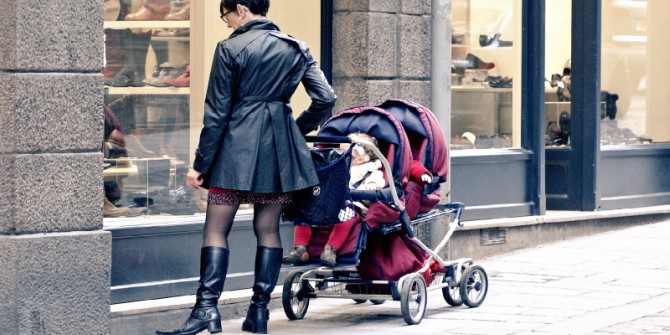
So here is what Jeremy Corbyn should have said: “Workplace cultures in which out-of-hours networking is key to professional success and career advancement indirectly discriminate against women because these networking practices exclude workers with caring responsibilities and the majority of those workers are still female.” I’m glad he didn’t say that. It would have got absolutely zero attention in Twitterville. Too complex.
Saying that women may self-exclude from the after-work pint because they are more likely to want to go home and look after their kids (if that really is what he said, let alone meant) is, of course, wrong on many levels. But did it stir a much-needed discussion about what is a fact: Workplace cultures in which decision making depends on out-of-hours, informal social activities and networking are bad for workforce diversity. Full-stop.
The after-work pint/pinot is a tall order for workers with caring responsibilities. If the nursery run awaits or a sick parent needs to have dinner taken to their door, spontaneously decanting to the pub once the office lights (finally) go out requires logistical miracles, money (to pay for a nanny or other substitute carer) or both. So no matter whether primary carers actually want to head home to their loved ones or go out with colleagues, the reality is that they often can’t. And, with no disrespect to all those sistahs who have made it in the office and the apparently growing number of equally involved or stay-at-home dads, the majority of primary carers are still female. So yes, if who gets in and on in the workplace depends on after-work drinks, women are disadvantaged.
As are a range of other workers. Workers from ethnic backgrounds that don’t drink alcohol, for instance. Or workers with various ranges of physical disabilities. If you are in a wheelchair or have hearing difficulties there are very practical obstacles to partaking in non-office jollities. Same for out-of-office socialising beyond the pub: rounds of golf and dinner invitations exclude those who are not familiar with that particular social practice, don’t have the money to finance it or the physical ability to take part. Which is why women, disabled workers, workers from working class and ethnic backgrounds find it still more difficult to break into the proverbial (white) old boys networks that make or break careers and deals in arts and culture, politics, banking, academia.
Banning the after-work pint/pinot is not the answer of course. Partly because it is only one component in a much bigger picture of how social relations influence the workplace – personal allegiances, likes and dislikes are formed at university, via parental acquaintances, on the golf course, at private dinner parties, in the sports club, in the community. You cannot police that even if you want to, just ask any society that ever experimented with equality-centred political models how effective and humanely that worked out.
More importantly, though: even in a world without out-of-office workplace interaction (something probably only theorists, dystopists and novelists can imagine) the problems would still persist. Because we are human. Because we are more likely to interact with people we like and who are like us – in terms of gender, class, ethnicity, age, bodily ability, nationality, accent, religion, football club allegiances, fashion choices and so on. We are unlikely to make unbiased, objective decisions about who gets the contract, the job, the promotion. If decades of social science research and centuries of historical evidence are anything to go by, that is a fact. There are things that can help, and we should definitely pursue them. To name just two examples: Women academics were more likely to be accepted as conference speakers if names and gender indicators were removed from their submissions. Similarly, female classical musicians are significantly more successful in blind auditions, in which a screen conceals the applicant from the appointment panels’ views.
But not even the most creative ways of re-designing decision practices at work will ever level the playing field if we don’t acknowledge and self-correct. We need to understand what we are doing when we talk contracts instead of holidays with colleagues after work. When we schedule a not-exactly-compulsory-but-good-to-be-at activity such as meetings and seminars at times that clash with the school run. Exclusion does not happen as a result of an amorphous, invisible force that permeates out society. Exclusion happens in myriads of everyday moments in which we act, think or talk in ways that directly or indirectly exclude others. For our society to exclude less, we need to challenge ourselves and change what we do. In the office, in the pub – and pretty much everywhere else.
♣♣♣
Notes:
- The post gives the views of its author, not the position of LSE Business Review or the London School of Economics.
- Featured image credit: unsplash.com, Pexels, under a CC0 licence
- Before commenting, please read our Comment Policy
 Doris Ruth Eikhof is Deputy Director of the CAMEo Research Institute for Cultural and Media Economies at the University of Leicester. She has worked and published extensively on careers and employment of cultural workers, focusing in particular on career management, self-entrepreneurship and workforce diversity and how they interlink, e.g., with cultural organisations’ business models and cultural policy. Since 2009 she has led 13 funded research projects including a large multi-disciplinary, multi-institutional research consortium for the AHRC, Nesta and Creative Scotland-funded Digital R&D Fund for Arts and Culture in Scotland. Further contract research included projects for Creative Scotland, Stills Gallery, Scottish Sculpture Workshop and Mugdock Makkers. From 2009-2013 Doris Ruth Eikhof was Research Co-ordinator and PhD Co-Ordinator for the Stirling Institute for Socio-Management, University of Stirling.
Doris Ruth Eikhof is Deputy Director of the CAMEo Research Institute for Cultural and Media Economies at the University of Leicester. She has worked and published extensively on careers and employment of cultural workers, focusing in particular on career management, self-entrepreneurship and workforce diversity and how they interlink, e.g., with cultural organisations’ business models and cultural policy. Since 2009 she has led 13 funded research projects including a large multi-disciplinary, multi-institutional research consortium for the AHRC, Nesta and Creative Scotland-funded Digital R&D Fund for Arts and Culture in Scotland. Further contract research included projects for Creative Scotland, Stills Gallery, Scottish Sculpture Workshop and Mugdock Makkers. From 2009-2013 Doris Ruth Eikhof was Research Co-ordinator and PhD Co-Ordinator for the Stirling Institute for Socio-Management, University of Stirling.





